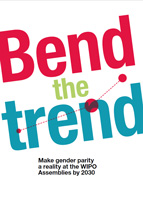Bend the Trend – Making Gender Parity a Reality at the WIPO Assemblies by 2030
October 2, 2017
The equal representation of women in decision-making is key to achieving the 2030 Agenda for Sustainable Development.
It has taken more than 36 years to get to 36% participation of women delegates at the WIPO Assemblies. Following this trend, it will take us until 2035 to reach parity.
As a member state you can take action to bend the trend and make gender parity a reality sooner:
- Institute quotas or targets to your own national delegations to ensure that at least 30% of delegates are women;
- Establish enforcement mechanisms to complement targets or quotas to ensure compliance, such as “comply or explain” rule;
- Expand leadership opportunities (such as Chairs and Co-Chairs) through the practice of co-leadership of one woman and one man or alternate Chairs of the opposite gender;
- Target training and capacity-building activities at women delegates to increase women’s participation in leadership and technical positions;
- Raise awareness and train both women and men delegates on issues related to gender equality to build greater support for women’s participation.
Find out more
- Shaping the International Agenda: Raising women’s voices in intergovernmental forums (UN Women and International Gender Champions, March 2017)
- Women at the WIPO Assemblies – Photos on Flickr

